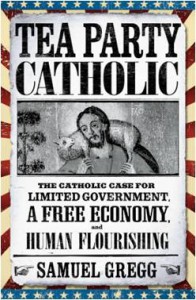 Kathryn Jean Lopez, at National Review Online, has interviewed Samuel Gregg, Acton’s Director of Research, on his newest book, Tea Party Catholic: The Catholic Case for Human Flourishing, a Free Economy and Human Flourishing. To begin, Lopez asks Gregg about the title of the book.
Kathryn Jean Lopez, at National Review Online, has interviewed Samuel Gregg, Acton’s Director of Research, on his newest book, Tea Party Catholic: The Catholic Case for Human Flourishing, a Free Economy and Human Flourishing. To begin, Lopez asks Gregg about the title of the book.
KATHRYN JEAN LOPEZ: Tell us about the title of the book. Does the Tea Party have anything to do with the Catholic Church?
SAMUEL GREGG: Tea Party Catholic itself has very little to say about the contemporary tea-party movement. But for those Americans who haven’t imbibed Progressivist ideology and who don’t think that the real America began when Franklin Roosevelt was elected president, the expression “tea party” is an especially evocative phrase. It immediately conjures up in people’s minds the American Revolution, the American Founding, and the American experiment in ordered liberty.
Lopez also asks about the term “subsidiarity,” an important concept in Catholic social teaching.
LOPEZ: What is subsidiarity?
GREGG: The very concise definitions of subsidiarity outlined in papal encyclicals ranging from Quadragesimo Anno and Centesimus Annus to Caritas in Veritate make it clear that we need to align the fulfillment of our responsibilities for our neighbor with the necessity of freedom. Why? Because the goal of solidarity isn’t securing an absolute equality for everyone in a given society. The objective is the all-around human flourishing of all individuals and communities. And to flourish, all of us need to make free choices for the good. Government, law, communities, and families obviously have a role in encouraging us to make the right choices, but in the end you can’t flourish unless you choose to do so.
Near the end of this substantial interview, Lopez asks an intriguing question: “What are we doing wrong in talking about religious liberty?” Gregg’s answer:
I think the Catholic bishops of America and others have done a good job in explaining why religious liberty matters for everyone. The problem is that many modern secular liberals aren’t listening. Why? Alas, I think much of the non-listening flows from the fact that, deep down, they just don’t regard religious liberty as especially important. When you read their writings, some of them can barely disguise their conviction that religious belief is simply an atavistic irrationality that will eventually disappear when the rest of us become as enlightened as they are. Some of them would, I think, be quite happy if the Church morphed into just another NGO, something, by the way, that Pope Francis consistently warns us against. But I have two suggestions to make about the way we should be talking about religious liberty. First, we could focus more attention upon the Founders’ attachment to religious liberty and to showing that efforts to relegate it to a fourth-level concern are thoroughly inconsistent with the American Experiment. Second, I’d suggest we present religious liberty in the context of the overall assault on the freedom and lives of Christians that’s going on throughout the rest of the world, and that John Allen documents so well in his new book The Global War on Christians.

